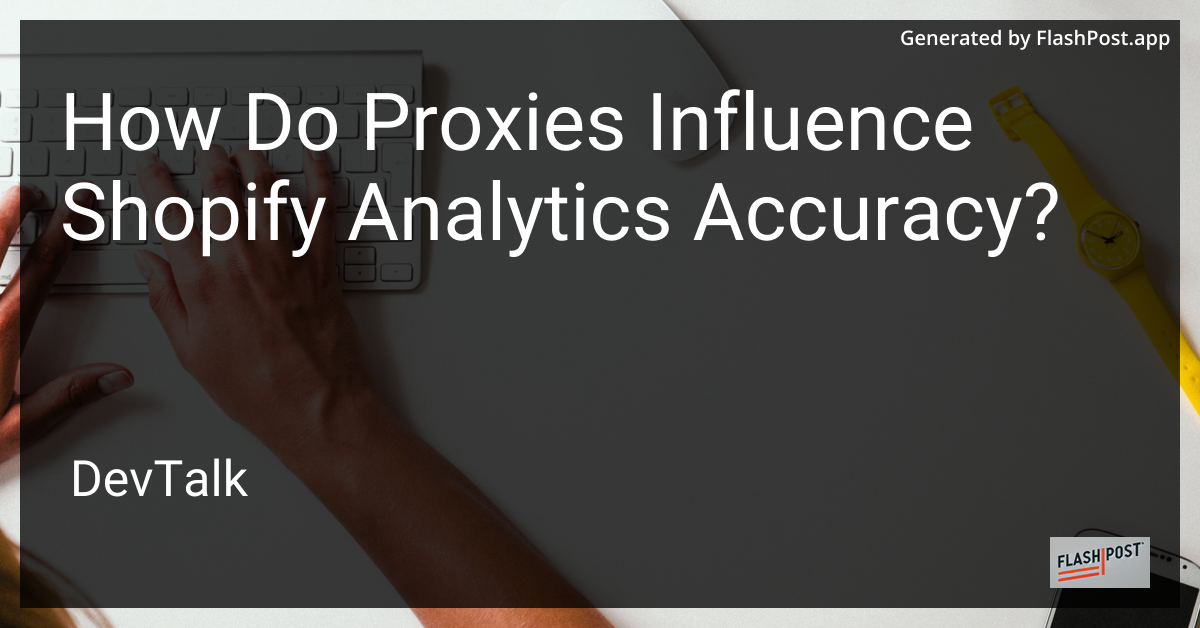How Do Proxies Influence Shopify Analytics Accuracy?

How Do Proxies Influence Shopify Analytics Accuracy?
In the world of e-commerce, accurate analytics are the cornerstone of informed decision-making.
Shopify, one of the leading e-commerce platforms, provides a robust analytics suite to help store owners understand customer behavior and optimize their marketing strategies. However, proxies can influence the accuracy of Shopify analytics, impacting data interpretation and strategic decisions.
Understanding Proxies and Their Role
Before delving into how proxies affect Shopify analytics, it's essential to understand what a proxy is. A proxy server acts as an intermediary between a user's device and the internet, masking the user's IP address and providing a layer of anonymity. They are frequently used for accessing region-restricted content, maintaining privacy, and managing multiple accounts without being flagged for unusual activity.
How Proxies Affect Shopify Analytics
-
Altering Traffic Data: Proxies can skew traffic source data. When multiple users access a Shopify store through a shared proxy, the analytics may consolidate these users into a single IP address. This situation leads to inflated session counts or erroneous geographic data, as the location is determined by the proxy server's IP and not the actual user's location.
-
Impact on Conversions: Proxies can also affect conversion metrics. For example, if a visitor using a proxy makes a purchase, their data might not reflect their true origin, leading to misinterpretation of customer demographics and preferences.
-
Influencing Bounce Rates: If a high number of users accessing the site through proxies leave immediately, it could indicate bot activity, resulting in elevated bounce rates. This alteration affects overall site performance analysis, skewing data crucial for understanding user engagement.
Mitigating Proxies' Impact on Analytics
To maintain the accuracy of Shopify analytics, here are a few strategies:
-
Implement IP Filtering: Shopify allows users to filter out specific IP addresses from analytics reports. By identifying and excluding known proxy IPs, store owners can reduce data distortion.
-
Use Advanced Analytics Tools: Consider integrating more sophisticated analytics tools that offer bot filtering and enhanced IP detection to identify proxy server activity more accurately.
-
Education on Proxy Usage: Encourage genuine customers to refrain from unnecessary proxy usage when accessing your store to maintain more accurate data readings.
The Broader Implications of Proxies
Proxies are not just relevant for Shopify analytics but for various other online activities. For a deeper insight into optimal proxy usage across platforms, you can explore this Optimal Twitter Proxy Usage guide.
Moreover, proxies play a significant role in SEO, offering benefits such as secure web scraping and anonymity. To learn more about how datacenter proxies assist with SEO efforts, check out this article on Proxy Benefits for SEO.
For those looking to purchase proxies, it's essential to read up-to-date reviews to ensure quality and effectiveness. Websites specializing in proxy reviews can provide valuable insights, and Best Proxy Review Websites is a great resource for finding reliable proxies at competitive prices.
Conclusion
While proxies offer undeniable benefits such as privacy and access to restricted content, they can distort the accuracy of Shopify analytics. By understanding how proxies affect data interpretation and implementing strategies to mitigate their impact, Shopify store owners can ensure that they are making informed decisions based on accurate analytics. Always remain vigilant and adjust strategies as needed to maintain the integrity of your analytics data.